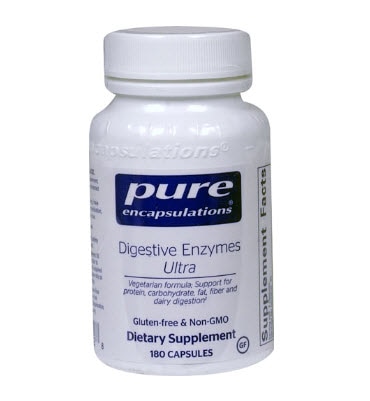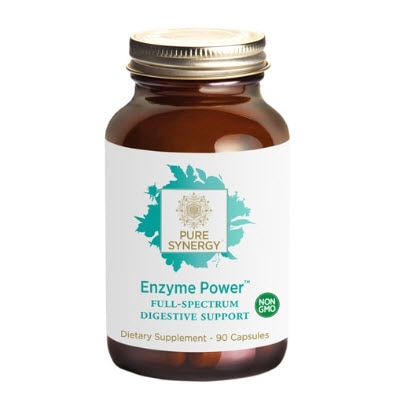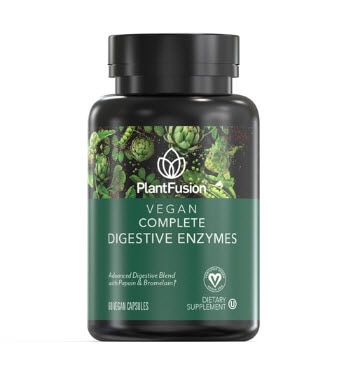Summary: Digestive enzyme supplements provide the tools your body needs to properly break down all the nutrients in your food, which is essential for comfort. By working on complex sugars, proteins, and fats, they help reduce common issues like gas, bloating, and food intolerances. Take them with your meal to ensure they can work immediately on the food you eat.
Your body uses enzymes to break down the food you eat and release its nutrients. But lifestyle factors, diet, and illness can reduce enzyme production and lead to symptoms like:
- Bloating
- Cramping
- Stomach pain
- Gas
- Stool changes
- Food intolerances
If you struggle with these symptoms and have been diagnosed with low enzymes, supplementing with enzymes can help. Here’s what to expect when you take digestive enzymes—and how to avoid potential side effects for best results.
5 Benefits of Enzymes for Digestive Symptoms
1. You won’t feel as bloated
High-fiber foods like beans and cruciferous vegetables (think broccoli and cauliflower) can leave you feeling bloated, especially if you’re not used to eating them. Bloating
can also occur when partially digested food passes from your stomach to your intestines. Taking digestive enzymes can combat bloating by breaking down food and helping your body process sugars and fibers.
Some research shows that digestive enzymes may reduce the inflammation, pain and bloating associated with IBS and IBD.
2. You’ll have less gas
Gas is a common cause of bloating that often results from intolerance to sugars in milk (lactose) or fruit (fructose). But beans, veggies and grains can also be the culprits.
Discomfort from excess gas may make you want to avoid healthy plant foods, but you don’t have to. An enzyme called alpha-galactosidase—sold under the brand name Beano—effectively reduces gas from eating plant-strong meals. If the fructose in fruit gives you a problem, the enzyme xylose isomerase could help.
3. You’ll be more regular
When you don’t have enough enzymes to digest fat, it can lead to diarrhea and greasy or discolored stools. Supplementing with lipase, the enzyme that breaks down fat, can increase fat absorption and the uptake of fat-soluble nutrients—including antioxidant polyphenols and vitamins A, D, E and K.†
IBS may also cause diarrhea. Studies show that a supplement containing a combination of digestive enzymes may reduce the symptoms.†
4. You might stop reacting to certain foods
Partially digested proteins may be the cause of some food allergies. The immune system mistakes these large protein fragments for invaders and launches an attack that results in allergy symptoms. Supplementing with the protein-digesting enzyme protease may relieve symptoms in people with confirmed digestive enzyme deficiencies.†
Histamine intolerance, a condition where histamine builds up in your body, may also cause symptoms similar to allergies or a cold. Eating foods that contain histamine, like spinach and avocados, can make symptoms worse. Some people find relief from supplementing with diamine oxidase (DAO), an enzyme that breaks down histamine to reduce it to normal levels.†
However, enzymes aren’t a cure for allergies. Never try to treat a life-threatening food allergy without help from a doctor or allergist.
5. You might absorb more nutrients
In a condition called exocrine pancreatic insufficiency (EPI), your pancreas doesn’t produce enough enzymes to fully digest what you eat. Because enzymes are required for your body to absorb nutrients from food, EPI can lead to nutrient deficiencies and unwanted weight loss. Restoring enzyme levels with prescription-strength supplements can correct absorption problems and restore healthy weight in people with EPI.†
How long does it take digestive enzymes to work?
You should begin to feel better right away when you start taking enzymes. For maximum benefits, follow the supplement manufacturer’s timing and dosage instructions. Most brands advise supplementing a few minutes before the start of a meal or with your first bite of food.
If symptoms persist, talk with your doctor. You may need a higher dose or a different combination of digestive enzymes to see results.
Side effects of digestive enzymes
You should only take a digestive enzyme supplement if your doctor has confirmed or has good reason to suspect that low enzymes are causing your symptoms. Taking digestive enzymes when you don’t need them can cause bloating, gas and diarrhea or worsen existing symptoms.
Some people may react to digestive enzyme supplements, which can cause itching, a rash or trouble swallowing. Stop taking enzymes immediately and call your doctor if you experience these symptoms.
Other side effects of digestive enzymes may include:
- Headaches
- Dizziness
- Changes in blood sugar
- Changes in bowel movements
- Cold-like symptoms
- Swelling
- Ear pain
- Neck pain
- Stomach pain
- Cramping
Who should avoid digestive enzymes?
Some enzymes may reduce the effectiveness of certain diabetes medications or increase the risk of bleeding if you take blood thinners. Don’t supplement with digestive enzymes if you have stomach ulcers or gallbladder disease.
Your doctor can run tests to determine if enzymes are the right treatment for your digestive symptoms and recommend the best supplement for fast relief.
What is the difference between digestive enzymes and probiotics?
Digestive enzymes and probiotics work in different, yet complementary, ways to support digestion. Digestive enzymes are proteins that act as a catalyst to break down complex food components like fats, proteins and carbohydrates directly, helping your body absorb nutrients immediately. Probiotics, on the other hand, are live microorganisms, or “good bacteria,” that help maintain a balanced and healthy environment in your gut over time, which can indirectly support digestion.
Are there natural food sources of digestive enzymes?
Some foods naturally contain digestive enzymes that may aid in breaking down nutrients. Examples include pineapple, which contains bromelain, and papaya, which contains papain; both are proteases that help break down protein. Other sources include avocados, which have lipase to break down fat, and raw honey, which contains amylase and protease. Eating a balanced diet rich in whole foods is the best way to support your natural digestive enzyme production.
What should I look for in a digestive enzyme supplement?
When selecting a digestive enzyme supplement, you should primarily look for a formula that contains the specific enzymes addressing your main symptoms, such as lactase for dairy or alpha-galactosidase for gas from beans; for broad support, look for a blend that includes amylase (for carbohydrates), protease (for protein), and lipase (for fats).†
Check the label to ensure the potency is listed using activity units (like DU, HUT, or LU) rather than just weight, as this measures the enzyme’s effectiveness.† Finally, verify the source of the enzymes—plant-based, fungal or animal—aligns with your dietary preferences, and choose a reputable brand free of unnecessary allergens or fillers.
†These statements have not been approved by the Food and Drug Administration. These products are not intended to diagnose, treat, cure or prevent disease.
Frequently Asked Questions
How do you know if your digestive enzyme levels are low?
Low digestive enzyme production is often diagnosed by a doctor who may order a specific test. One of the most common is a fecal elastase test, which measures the amount of the enzyme elastase in a stool sample. Low levels can indicate exocrine pancreatic insufficiency (EPI), a condition where the pancreas doesn’t produce enough enzymes. Other methods include a fecal fat test or a secretin pancreatic function test, which assesses the pancreas’ response to a hormone.
Is it OK to take digestive enzymes every day?
For individuals who do not have a confirmed chronic enzyme deficiency, daily use of over-the-counter enzymes is generally not recommended long term and could potentially suppress your body’s natural enzyme production, leading to dependency. Digestive enzymes should ideally be used temporarily or only as needed for occasional symptoms, and you should always consult a healthcare professional before starting any daily supplement routine.
When is the best time to take digestive enzymes?
The best time to take digestive enzyme supplements is immediately before or at the beginning of a meal or snack, as their job is to actively break down the food you consume. Since these enzymes mimic those naturally produced by your body to process fats, proteins and carbohydrates, they must be present in the digestive tract when the food arrives to be effective. Taking them on an empty stomach is generally ineffective, but taking them right when you start eating allows them to immediately begin their work, optimizing nutrient absorption and helping to reduce common digestive symptoms like gas and bloating. For larger or longer meals, some people find it beneficial to take half the dose at the start and the remaining half partway through the meal.




